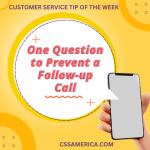Every organization that gains customers is in a position to lose customers. For the sports organization, it’s the lost account holder. For the healthcare provider, it’s the member who enrolls with the competitor at the end of the year. The retailer, the software provider, the financial services firm – lost customers occur, typically with clear financial repercussions. Even with local government, it’s the customer moving elsewhere, the customer circumventing the system, the resident griping and complaining. Maybe that loss is loss of support, but it is still a loss.
So, if you’re smart enough or lucky enough to get a chance to identify the reason for the loss, maybe there’s a chance you win them back. Or at least there’s a good chance that you can put some improvement in place to mitigate similar losses in the future.
If you’re formulating a survey or talking with the customer, create some structure around how you ask about exit reasons. Use this framework as a starting point: Think about Product, People, Process, Policy, and the Place. You’re trying to get a holistic view of the customer experience in those controllable categories of exit reasons.
For Product or Service, what about the product could have been improved? What could have been done so it stood out a little more relative to the competition?
For People, think about the organization, the culture, how those communications flow and how those relationships are developed. Ask the customer about the attitude, skills, knowledge of your team. How do they communicate with the customer? And did the company as a whole proactively communicate with the customer – trying to keep the relationship strong?
Regarding Process, how self-evident is the experience? What are the wait times or lead times like for the customer? Is everything as self-evident as possible? Are the terminology and technology and paperwork simple enough and clear enough for any customer to understand and navigate?
Do the Policies restrict the customer experience or enhance it? Are policies conveyed clearly, and are they in the best interests of the customer?
And what about the Place? This could mean the physical facility or the environment that people experience online or with your apps. Is it intuitive and clear and, again, easy to navigate?
There are many reasons why companies lose customers. To win them back, organize your thoughts within this framework.
Consider the Product, the People, the Process, the Policy, and the Place.
Signup for FREE Tips! Contact Us More Resources for You Visit Our Home Page
























